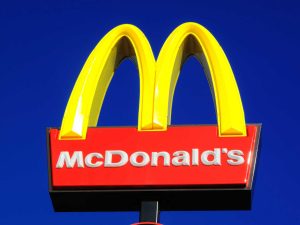 McDonald’s Corp. (NYSE:MCD) has agreed to sell the bulk of its China and Hong Kong business for up to $2.1 billion in a 20-year deal. The deal will form a new company that will link McDonalds with Chinese company CITIC Limited, affiliate company CITIC Capital Holdings, and the Carlyle Group. CITIC Ltd will own about 32 percent of the business under the deal, with CITIC Capital holding another 20 percent. Carlyle will control a further 28 percent of the business, while McDonald’s will retain a 20 percent stake.
McDonald’s Corp. (NYSE:MCD) has agreed to sell the bulk of its China and Hong Kong business for up to $2.1 billion in a 20-year deal. The deal will form a new company that will link McDonalds with Chinese company CITIC Limited, affiliate company CITIC Capital Holdings, and the Carlyle Group. CITIC Ltd will own about 32 percent of the business under the deal, with CITIC Capital holding another 20 percent. Carlyle will control a further 28 percent of the business, while McDonald’s will retain a 20 percent stake.
McDonald’s will get cash and new shares under the terms of the agreement. The new company will act as the master franchisee for the 20-year period. About two-thirds of the China operation’s 2,640 outlets that are now owned by McDonald’s will be refranchised. McDonald’s has been emphasizing shifting restaurants to franchisees in recent years. The move lets the fast food chain shed the expenses related to staff and operations while still making a profit.
The China business employs more than 120,000 people. The company has roughly 2,400 restaurants in mainland China and nearly 240 in Hong Kong. McDonald’s is China’s second-biggest fast-food company after Yum Brands’ KFC. In Hong Kong, McDonald’s is the largest quick service restaurant chain. The new partnership plans to add 1,500 new restaurants in the two areas over the next five years.
The transaction is part of a global business overhaul being carried out by the American company. McDonald’s said in March it was reorganizing operations in the region, which includes China, Hong Kong and South Korea. The company reportedly wanted to raise up to $3 billion from the sale of the business originally. It later decided to keep its South Korea business and retain a minority stake in the rest to benefit from exposure to future growth in China.
McDonald’s CEO Steve Easterbrook said in a statement, “China and Hong Kong represent an enormous growth opportunity for McDonald’s.” The partnership will aim to boost sales at existing restaurants as well as speed up growth through openings. The deal is expected to be completed by mid-2017. The transaction still needs approval from regulators.
